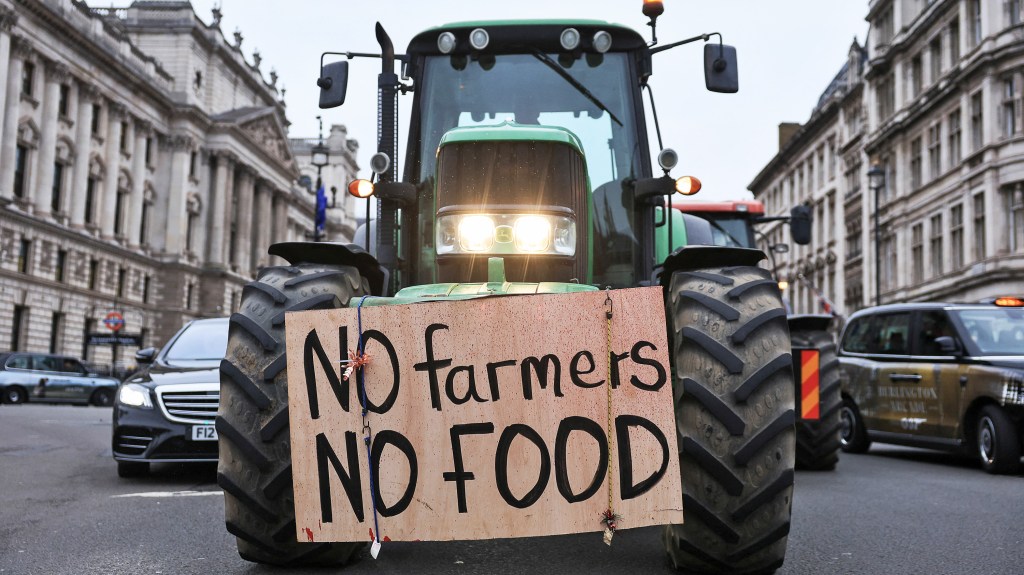Farmers’ Union Warns Elderly May Consider Suicide to Escape Inheritance Tax
Members of Parliament were informed that elderly farmers and those in declining health might contemplate suicide to evade inheritance tax on their estates, as hundreds of tractors flooded into London in protest.
Starting April 2026, farms valued over £1 million will face a 20 percent inheritance tax due to modifications to agricultural property relief announced in the recent budget. The government claims this policy change is necessary to generate approximately £500 million for public services by 2027.
Tom Bradshaw, the president of the National Farmers’ Union (NFU), expressed his concerns about the profound human implications of this tax overhaul during a session with the environment, food, and rural affairs committee. He highlighted that many older farmers may be unable to take advantage of a seven-year tax-free gifting period to lessen the inheritance tax burden.
“Those individuals who genuinely are in poor health or doubt their longevity may feel that they won’t be around by April 2026, when these changes take effect,” he stated during the committee meeting on Wednesday.
Emotion visibly overcame Bradshaw as he presented his case to the committee. “This is not merely about money. It’s about a lifetime of labor and the stewardship of the farm,” he emphasized.
A group of around 50 Labour MPs has reportedly formed a WhatsApp group aiming to persuade the government to reverse its decision. Some MPs are advocating for a significant increase in the inheritance tax threshold beyond £1 million, to more accurately identify individuals exploiting the relief to evade taxes.
One Labour representative remarked to Politico that “the existing plan fails to achieve its intended objectives.” Despite this, the Prime Minister’s spokesperson reiterated on Wednesday that no alterations to the policy will occur.
The NFU, alongside other agricultural organizations including the Country Land and Business Association (CLA) and the Tenant Farmers Association, has called on the government to suspend the proposed tax reforms. Victoria Vyvyan, president of the CLA, expressed frustration, stating, “We’ve had extensive discussions [with government officials] with little indication that our concerns are being acknowledged.”
Bradshaw also noted that the tax modifications could hinder essential environmental reforms.

“The industry needs to invest significantly in the next decade to fulfill our environmental responsibilities. Current inheritance tax policies divert funds that should be allocated to future investments to mitigate environmental risks,” he explained.
Stuart Maggs, a partner at the law firm Howes Percival, informed the committee that farms may need to liquidate land or shut down entirely to meet tax obligations, predicting that this would occur frequently.
When queried by MPs, experts disagreed on how many farms would be affected by this tax change. Treasury estimates suggest around 500 farms annually, whereas the NFU claims approximately three-quarters of farms could be impacted.

The parliamentary hearing coincided with a demonstration where about 200 tractors gathered in central London to voice opposition to the tax reforms.
Farmers have stated their intent to block roads and disrupt the national food supply if the government does not reconsider its stance.
As tractors assembled on Whitehall, protest leaders alerted the Prime Minister and Chancellor of looming discontent, describing the protest as merely a “warning shot.”
Speaking outside Downing Street, a seasoned farmer conveyed that while they do not see themselves as militants, farmers are ready to affect food supplies if their grievances are ignored.
One protest organizer, David Catt from Broughton Monchelsea in Kent, warned: “Mr. Starmer, if you do not reconsider this poorly conceived budget, conditions will worsen. We can halt this country in no time with the equipment we have here today.”
The founder of the Save British Farming group drew parallels between the current crisis and the demise of the coal mining industry in the 1980s. “The government is intent on destroying the countryside much like they claim Thatcher did to the coal mines. I pledge to fight tirelessly to ensure our continued presence, aiming to replace Keir Starmer and Rachel Reeves in the process,” she declared.
Farmers indicated to The Times that if their voices remain unheard, they will resort to adopting more vocal protest strategies similar to those seen from French farmers.
Jeff Gibson, 47, confirmed that farmers possess the ability to “bring this country to a complete standstill” but clarified, “we don’t want to become similar to Just Stop Oil.”
Following the protest, Clacton MP and leader of Reform UK, Nigel Farage, met with demonstrators outside the Houses of Parliament.


Environment Secretary Steve Reed assured farmers of the government’s unwavering support, stating that efforts are underway to expedite funding into farmers’ accounts while also launching the new Countryside Stewardship Higher Tier scheme to offer more flexible actions, better payments to aid cash flow, and a continuous application window.
The protest unfolded alongside a government report indicating that extreme weather conditions significantly affect Britain’s food production capabilities.
The food security report, released every three years, highlighted the detrimental impact of extreme weather on arable crops, fruits, and vegetables. Last winter recorded some of the highest rainfall levels, leading to crop damage due to flooding and hindered planting.
The report did, however, confirm that food security in the UK remains stable, with domestic food consumption increasing slightly to 62 percent last year from 61 percent in 2021.
Additionally, the report acknowledged a long-term decline in environmental health, stating that the deterioration of “natural capital,” crucial for food production, poses a significant risk to future food supplies.




Post Comment